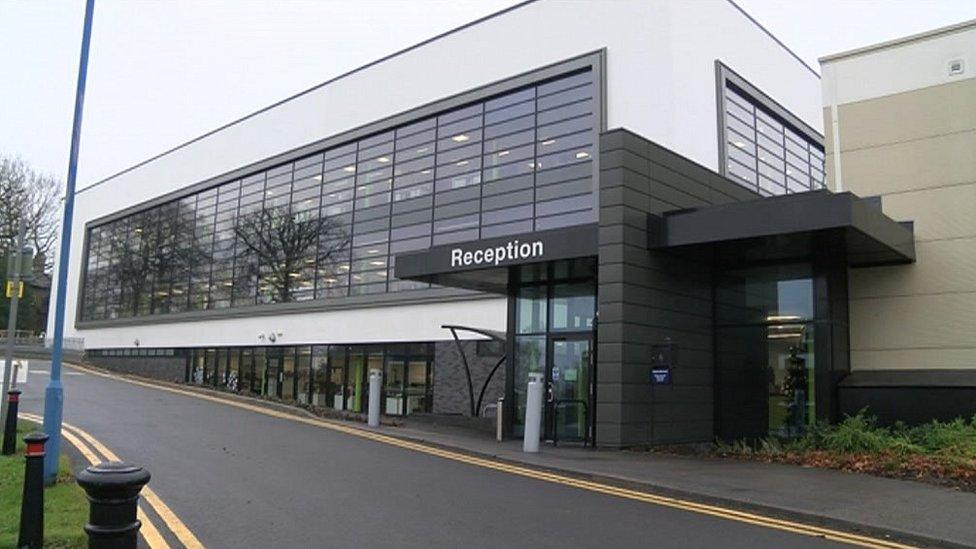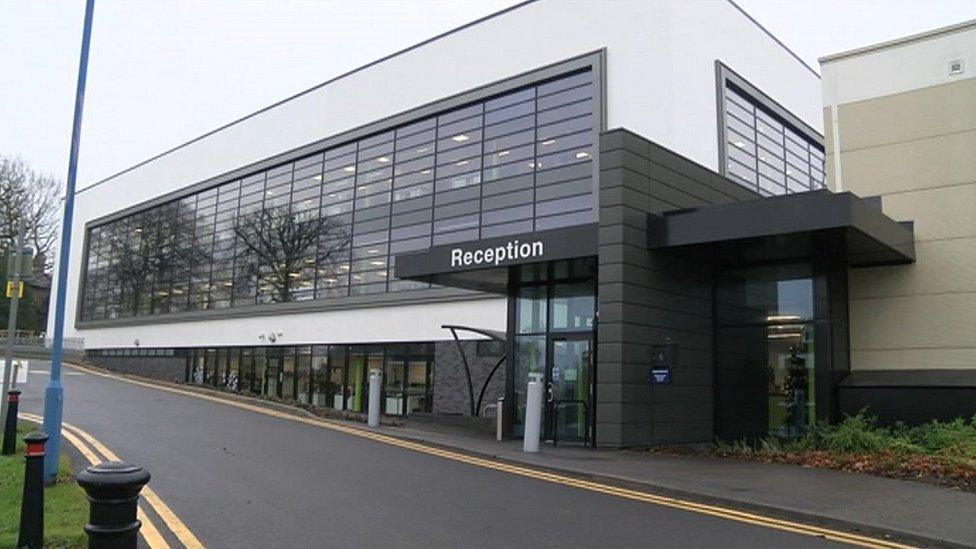Man died after he was restrained by Derbyshire Police
- Published

Police made a mandatory referral to the police watchdog after the death
A man died after he was restrained by police after he assaulted an officer, an inquest heard.
Shaun Aherne died after he was arrested by Derbyshire Police and detained at Chesterfield Police Station in January 2018.
His inquest heard officers were not aware he suffered significant heart disease when they handcuffed him and forced him to the ground.
Derbyshire Police said practices had since been improved.
Mr Aherne, 42, was arrested for assault and possession of cannabis on 7 January 2018, after what police described as a "domestic incident" in Pleasley, in Derbyshire.
A week-long inquest, which concluded at Chesterfield Town Hall on Monday, was told he was taken to the police station.
The inquest heard he had assaulted a police officer and was restrained.
Brain damage
A report, by coroner Peter Nieto, said: "Mr Aherne was taken to the ground and restrained by the use of barred handcuffs, velcro leg straps and spit hood.
"Mr Aherne was carried face down in the prone position by five officers directly to the cell, bypassing the custody desk, in order to reduce the time spent in restraints and disruption to the rest of the custody suite and other detainees."
The report said Mr Aherne continued to resist officers who took him to a cell and cut off his clothes. He was left in the cell and later found to be unresponsive.
The inquest heard he suffered a heart attack which led to fatal brain damage.
'Accumulated stress'
A healthcare member of staff performed cardiopulmonary resuscitation (CPR) before Mr Aherne was taken by ambulance to hospital and placed on life support but he died on 10 January.
The inquest jury returned a narrative verdict that Mr Aherne died due to the physical and psychological stress of being restrained in police custody because he had significant heart disease, which was not known at the time.
The inquest found he was also under the influence of cannabis and likely poor mental health, which added to his level of physical and psychological stress.
The jury found the combination of Mr Aherne's heart disease, intoxication, poor mental health, the use of restraints, and the accumulated stress of the whole experience contributed to his death.
The coroner's report added: "It is apparent that police custody staff did not purposefully assess Mr Aherne's level of consciousness and vital signs before leaving him in the cell.
"It is believed that had they done so it is possible that his deteriorating condition would have been recognised, and it is possible that interventions could have been provided to avoid his death."
'Deepest condolences'
The jury noted other issues which they said did not contribute to Mr Aherne's death but were significant.
These included the fact that a healthcare professional was not consulted for assessment or advice from arrival at custody until Mr Aherne was found unresponsive in his cell.
It also heard the removal of Mr Aherne's clothing was unnecessary and unjustified, and the custody sergeant did not separate from the restraint to oversee and direct the restraint and manage checks of Mr Aherne's vital signs and physical wellbeing.
Assistant Chief Constable James Abdy said: "My thoughts firstly go out to Mr Aherne's family, and I would like to offer our sincere and deepest condolences for their loss.
"The Inquest heard detailed evidence regarding the circumstances surrounding Mr Aherne's death and the jury have reached a verdict for which Derbyshire Constabulary fully accept.
"The evidence showed that there were aspects of Mr Aherne's care while in custody, which were not to the standard we would expect. Practices in custody have continued to evolve since 2018 and the force has embarked on a comprehensive plan of improvement.
"We will now consider any additional organisational learning that can be taken from this tragedy, as we strive to deliver a consistent and transparent custody operation that is safe, effective, and efficient."

Follow BBC East Midlands on Facebook, external, on Twitter, external, or on Instagram, external. Send your story ideas to eastmidsnews@bbc.co.uk, external
Related topics
- Published18 January 2018
